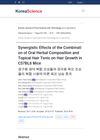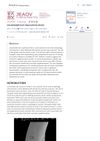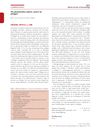 June 2023 in “Research journal of topical and cosmetic sciences”
June 2023 in “Research journal of topical and cosmetic sciences” The polyherbal lotus oil with amla, hibiscus, bhringraj, and methi promotes hair growth effectively, similar to minoxidil.
 March 2023 in “Applied and Computational Engineering”
March 2023 in “Applied and Computational Engineering” Deep learning models can analyze scalp diseases effectively.
March 2023 in “Aktualʹnì pitannâ farmacevtičnoï ì medičnoï nauki ta praktiki” Both new minoxidil formulations significantly stimulated hair growth and improved dermal metabolism.
[object Object] December 2021 in “Egyptian Journal of Dermatology and Venereology” Oxidative stress may worsen female pattern hair loss and could help track the disease and treatment.
 October 2023 in “Siriraj Medical Journal”
October 2023 in “Siriraj Medical Journal” Taking iron pills does not improve hair loss treatment in women with low iron compared to using minoxidil alone.
 1 citations,
April 2012 in “Korean Journal of Food Science and Technology”
1 citations,
April 2012 in “Korean Journal of Food Science and Technology” Using both oral herbal supplements and hair tonic together works better for hair growth than using just the tonic.
 1 citations,
July 2022 in “Functional foods in health and disease/Journal of functional foods in health & disease”
1 citations,
July 2022 in “Functional foods in health and disease/Journal of functional foods in health & disease” Taking a probiotic supplement twice a day improved hair growth, skin hydration, and metabolic health in adults at risk of metabolic syndrome.
 5 citations,
April 2013 in “Nasza Dermatologia Online”
5 citations,
April 2013 in “Nasza Dermatologia Online” Oral zinc therapy is effective for treating acrodermatitis enteropathica.
[object Object]  65 citations,
January 2009 in “Annals of Dermatology”
65 citations,
January 2009 in “Annals of Dermatology” Zinc supplements increased zinc levels in some hair loss patients but didn't significantly improve hair growth.
 9 citations,
September 2018 in “Clinical, Cosmetic and Investigational Dermatology”
9 citations,
September 2018 in “Clinical, Cosmetic and Investigational Dermatology” One supplement improved hair loss and quality faster and more effectively than the other in treating telogen effluvium.
 March 2024 in “Indian Journal of Dermatology”
March 2024 in “Indian Journal of Dermatology” Iron supplements may improve hair loss satisfaction even if initial iron levels are normal.
 5 citations,
September 2017 in “Journal of Cosmetic Dermatology”
5 citations,
September 2017 in “Journal of Cosmetic Dermatology” A marine protein-based dietary supplement can safely boost hair growth and reduce hair loss in people with thinning hair.
 September 2024 in “Journal of the American Academy of Dermatology”
September 2024 in “Journal of the American Academy of Dermatology” Iron infusions can help improve hair loss in patients who can't take oral iron supplements.
 207 citations,
April 2006 in “Journal of The American Academy of Dermatology”
207 citations,
April 2006 in “Journal of The American Academy of Dermatology” Iron deficiency may be related to hair loss, but there's not enough evidence to recommend iron screening or supplements for all hair loss patients.
16 citations,
January 2010 in “Journal of Korean medical science/Journal of Korean Medical Science” A Korean boy's skin and digestive symptoms were caused by a rare genetic disorder that affects zinc absorption, and he got better with zinc supplements.
170 citations,
May 1979 in “The journal of pediatrics/The Journal of pediatrics” Two sisters with rickets and hair loss had a genetic issue with vitamin D processing, and only improved when given phosphorus supplements.
 71 citations,
January 2016 in “International Journal of Trichology”
71 citations,
January 2016 in “International Journal of Trichology” Biotin deficiency is not a major cause of hair loss in women, so biotin supplements are not likely to be an effective hair loss treatment.
16 citations,
November 2008 in “Journal of the American Academy of Dermatology” Consider necrolytic acral erythema in similar cases and treat with oral zinc sulfate.
 February 2023 in “JEADV Clinical Practice”
February 2023 in “JEADV Clinical Practice” Biotin supplements significantly improved a young girl's uncombable hair.
 July 2018 in “International journal of clinical & experimental dermatology”
July 2018 in “International journal of clinical & experimental dermatology” Eat a balanced diet for healthy hair; only use supplements if you have a proven nutrient deficiency.
 3 citations,
January 2019 in “International Journal of Trichology”
3 citations,
January 2019 in “International Journal of Trichology” The article concludes that treating hair loss requires careful research, understanding the causes, and personalized treatment plans.
 2 citations,
May 2011 in “British Journal of Dermatology”
2 citations,
May 2011 in “British Journal of Dermatology” Pellagra, caused by niacin deficiency and presenting with photosensitivity, should be considered in patients with relevant symptoms and risk factors.
 November 2018 in “Springer eBooks”
November 2018 in “Springer eBooks” Children need early diagnosis and treatment for iron-deficiency anemia to prevent learning problems and promote health.
March 2018 in “The journal of applied laboratory medicine” The rash on the infant indicated a serious underlying condition.
 January 2018 in “The Egyptian Family Medicine Journal”
January 2018 in “The Egyptian Family Medicine Journal” Iron deficiency anemia is significantly linked to hair loss in childbearing women, and taking iron improves the condition.
 21 citations,
June 2011 in “Journal of child neurology”
21 citations,
June 2011 in “Journal of child neurology” Valproic acid and carbamazepine do not change biotin or biotinidase levels but may lower zinc levels, still within normal range.
 3 citations,
November 2021 in “Applied Microscopy”
3 citations,
November 2021 in “Applied Microscopy” Hair microscopy is a simple and cost-effective method to help diagnose systemic diseases in children.
April 2022 in “DOAJ (DOAJ: Directory of Open Access Journals)” Effective hair regrowth after COVID-19 involves psychological support, good nutrition, and hair growth treatments.

There are many treatments for common hair loss, but more trials are needed to decide which are best.






















